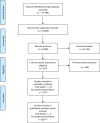Systematic review and meta-analysis of randomized controlled trials of psychological interventions to improve glycaemic control in children and adults with type 1 diabetes
- PMID: 32022290
- PMCID: PMC7217004
- DOI: 10.1111/dme.14264
Systematic review and meta-analysis of randomized controlled trials of psychological interventions to improve glycaemic control in children and adults with type 1 diabetes
Abstract
Aim: We conducted a systematic review aggregate and network meta-analysis of psychological interventions for people with type 1 diabetes to assess their effectiveness in improving glycaemic levels.
Methods: We searched the following databases from 1 January 2003 to 1 July 2018: MEDLINE, CINAHL, PsycINFO, Embase, Cochrane Controlled Trials, Web of Science, clinicaltrials.gov, Dissertation Abstract International. We included randomized controlled trials (RCT) of psychological interventions for children and adults with type 1 diabetes reported in any language. We extracted data on publications, participant characteristics at baseline, intervention and control group, and data for the primary outcome, change in glycaemic control [HbA1c (mmol/mol/%)]. Study authors were contacted for missing data. The review was registered with international prospective register of systematic reviews registration (PROSPERO) CRD42016033619.
Results: Twenty-four adult RCTs and 23 of children with type 1 diabetes were included in the systematic review. In aggregate meta-analysis there was no overall effect of psychological intervention compared with control on HbA1c [adults, nine RCTs, n = 1102, pooled mean difference -0.12, 95% confidence intervals (CI) -0.27 to 0.03, I2 = 29.0%, P = 0.19; children, 20 RCTs, n = 2567, -0.09, 95% CI -0.22 to 0.04, I2 =54.0% P=0.002]. Network meta-analysis suggested that probability and rank-ordering of effectiveness is highest for attention control groups (b = -0.47, 95% CI -0.80 to -0.12) followed by cognitive behavioural therapy (CBT) (-0.26, 95% CI -0.45 to -0.06) compared with usual care for adults.
Conclusions: Overall psychological interventions for children and adults with type 1 diabetes do not improve glycaemic control. For adults, CBT-based interventions have the potential to be effective.
© 2020 The Authors. Diabetic Medicine published by John Wiley & Sons Ltd on behalf of Diabetes UK.
Figures



References
-
- Hood KK, Huestis S, Maher A, Butler D, Volkening L, Laffel LMB. Depressive symptoms in children and adolescents with type 1 diabetes: association with diabetes‐specific characteristics. Diabetes Care 2006; 29: 1389–1391. - PubMed
-
- Young V, Eiser C, Johnson B, Brierley S, Epton T, Elliott J et al Eating problems in adolescents with Type 1 diabetes: a systematic review with meta‐analysis. Diabet Med 2013; 30: 189–198. - PubMed
-
- Kongkaew C, Jampachaisri K, Chaturongkul CA, Scholfield CN. Depression and adherence to treatment in diabetic children and adolescents: a systematic review and meta‐analysis of observational studies. Eur J Pediatr 2014; 173: 203–212. - PubMed
-
- Barnard K, Skinner T, Peveler R. The prevalence of co‐morbid depression in adults with Type 1 diabetes: systematic literature review. Diabet Med 2006; 23: 445–448. - PubMed
Publication types
MeSH terms
Substances
Grants and funding
LinkOut - more resources
Full Text Sources
Medical
Miscellaneous

